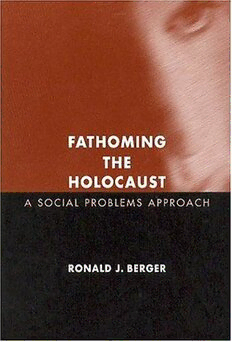
Fathoming the Holocaust: a social problems approach PDF
251 Pages·2002·39.938 MB·English
Most books are stored in the elastic cloud where traffic is expensive. For this reason, we have a limit on daily download.
Preview Fathoming the Holocaust: a social problems approach
Description:
Of books on the Holocaust in Europe there is no end, but this one is distinct, the first to explain the Final Solution to the "Jewish Problem" from the perspective of social problems construction. Comprehensive in scope, it covers the origins and implementation of the genocidal strategy of National Socialism, the wartime reaction to it, and the postwar collective memory of the genocide. Fathoming the Holocaust opens by reviewing how historians have studied the subject, considering several avenues of sociological analysis, and introducing the approach the author will adopt. It then looks at the historical construction of the "Jewish problem" as it was constituted through Christian and racial claims about Jews. The rise of Hitler’s movement to power is examined, as well as the subsequent formulation of successive solutions to the "Jewish problem," a formulation that evolved through legislation and then emigration/deportation to the Final Solution. Next, it considers the organizational settings and processes involved in implementing these solutions, and explores the roles of collaborators and businesses profiting from the solutions. However, the Final Solution did not proceed without resistance from those, Jews and Gentiles, including Allied governments, who organized to thwart the implementation process. These attempts at subversion of the process of destruction are given appropriate measure in Berger’s pages. The natural history of the Holocaust did not end with the defeat of Nazism, for the postwar memory of those events constitutes a problem in its own right. Thus the book continues into the postwar period by examining how collective memories of the genocide were constructed in three nations central to Holocaust memory: Israel, the Federal Republic of Germany, and the United States. Berger concludes by considering a set of interrelated issues that have emerged latterly as significant problems. Among these are the problem of religious faith, the problems of Jewish continuity and of Christian-Jewish reconciliation, and the general problem of "difference" that underlies various forms of exclusionary social practices.
See more
The list of books you might like
Most books are stored in the elastic cloud where traffic is expensive. For this reason, we have a limit on daily download.
